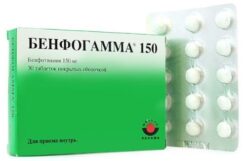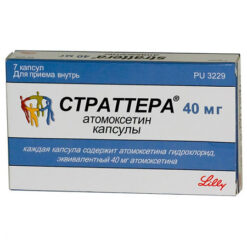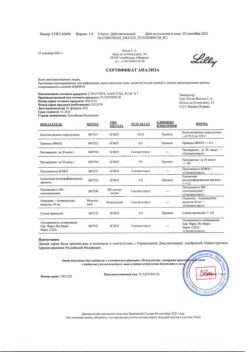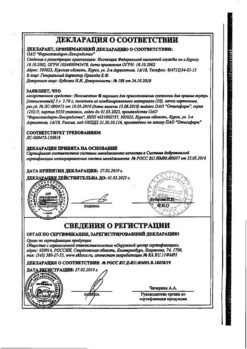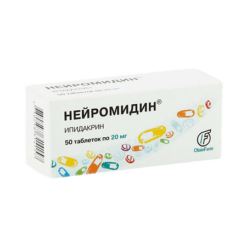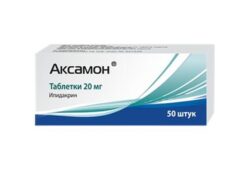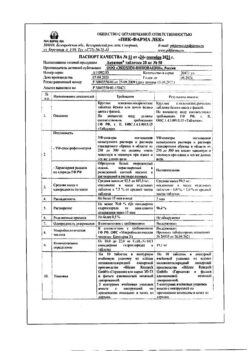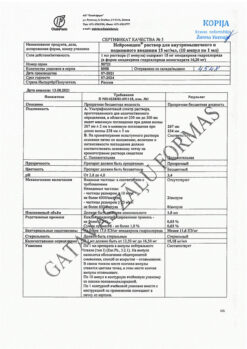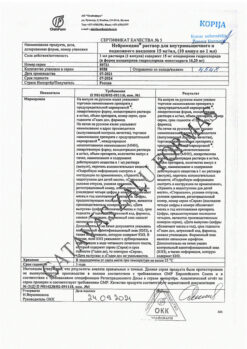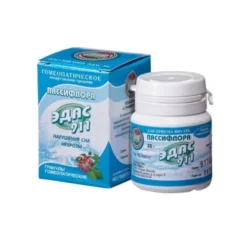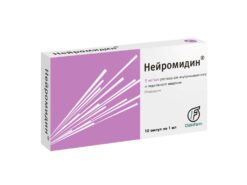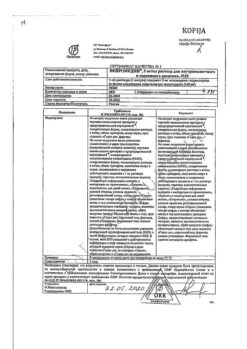No products in the cart.
Infibeta lyophilizate 9.6 mln IU 15 pcs.
€1.00
Out of stock
(E-mail when Stock is available)
Description
Infibeta – interferon beta-1b has antiviral and immunomodulatory activity. The mechanism of action of interferon beta-1b in multiple sclerosis (MS) has not been finally established. However, it is known that the biological effect of interferon beta-1b is mediated by its interaction with specific receptors that are found on the surface of human cells.
The binding of interferon beta-1b to these receptors induces the expression of a number of substances that are considered to mediate the biological effects of interferon beta-1b. The content of some of these substances was determined in the serum and blood cell fractions of patients receiving interferon beta-1b. Interferon beta-1b reduces the binding ability of the interferon g receptor and increases its internalization and degradation. In addition, interferon beta-1b increases suppressor activity of peripheral blood mononuclear cells.
In both remitting and secondary progressive multiple sclerosis, treatment with interferon beta-1b reduces the frequency (by 30%) and severity of clinical exacerbations of the disease, the number of hospitalizations and the need for treatment with glucocorticosteroids, and also prolongs the duration of remission.
In patients with secondary progressive MS, treatment with interferon beta-1b can delay further disease progression and the onset of disability, including severe disability (i.e., when patients are forced to use a wheelchair permanently) for up to 12 months.
This effect is seen in patients with both exacerbations of the disease and without exacerbations, as well as with any disability index (the study involved patients with a score from 3 to 6.5 on the Extended Disability Rating Scale).
The results of magnetic resonance imaging of the brain of patients with remitting and secondary progressive multiple sclerosis on treatment with interferon beta-1b confirm a significant positive effect of the drug on the severity of the pathological process, as well as a significant reduction in the formation of new active foci.
Indications
Indications
Active ingredient
Active ingredient
Composition
Composition
1 vial contains:
Active ingredient:
interferon beta-1b – 0.25 mg;
Associates:
Human albumin – 15 mg,
Mannitol – 15 mg.
Solvent:
Sodium chloride – 5.4 mg,
water for injection – up to 1 ml.
How to take, the dosage
How to take, the dosage
Subcutaneously in a dose of 8 million IU every other day.
The treatment is prolonged.
Interaction
Interaction
The use of interferon beta-1b concomitantly with immunomodulators other than glucocorticosteroids or corticotropin has not been studied.
Caution should be exercised when using interferon beta-1b in combination with other drugs metabolized by certain cytochrome P450 isoenzymes. This group includes some commonly used antipyretics and analgesics, antidepressants, anticonvulsants. Caution should also be exercised with the concomitant use of any drugs that affect the hematopoietic system.
If any additional medications need to be taken for an extended period of time, a doctor should be consulted.
In the absence of compatibility studies, this medication should not be mixed with other medications.
Special Instructions
Special Instructions
Immune disorders
The use of cytokines in patients with monoclonal gammopathy was sometimes accompanied by a systemic increase in capillary permeability with the development of shock and death.
Gastrointestinal disorders
In rare cases the development of pancreatitis was observed against the background of Infibetà use, in most cases associated with the presence of hypertriglyceridemia.
Nervous system impairment
Patients should be informed that a side effect of the drug Infibietaà may be depression and suicidal thoughts, on the appearance of which they should immediately consult a physician.
Two controlled clinical studies involving 1,657 patients with secondary progressive MS found no significant difference in the incidence of depression and suicidal ideation with interferon beta-1b or placebo. Nevertheless, caution should be exercised when administering the drug Infibeta in patients with depressive disorders and suicidal thoughts in anamnesis.
If there are such phenomena during treatment, the expediency of canceling the drug Infibeta should be considered.
The drug Infibeta should be used with caution in patients with seizures in anamnesis.
This drug contains human albumin, and for this reason there is very little risk of viral disease transmission. The theoretical risk of transmission of Creutzfeldt-Jakob disease is also considered highly unlikely.
Changes in laboratory values
. In addition to the standard laboratory tests prescribed in the management of patients with multiple sclerosis, a complete blood count, including white blood cell count, platelet count, and biochemical blood count, as well as liver function tests (e.g., aspartate aminotransferase (AST), alanine aminotransferase (ALT) and g-glutamyltransferase (g-GT) activities) are recommended before starting therapy with Infibeta as well as regularly during the course of treatment. When managing patients with anemia, thrombocytopenia, leukopenia (alone or in combination), a more thorough monitoring of the detailed blood count, including determination of erythrocyte, leukocyte, platelet and leukocyte formula numbers may be required.
Hepatic and biliary tract disorders
Clinical studies have shown that interferon beta-1b therapy can often cause asymptomatic elevations in hepatic transaminases that are mild and transient in most cases.
As with treatment with other interferon beta, severe liver damage (including hepatic failure) is rare with Infibet. The most severe cases have been observed in patients exposed to hepatotoxic drugs or substances, as well as in some comorbidities (e.g., malignant neoplasms with metastasis, severe infections and sepsis, alcoholism).
Liver function should be monitored during treatment with Infibeta (including assessment of the clinical picture).
Elevated serum transaminase activity requires close monitoring and examination. In case of a significant increase in serum transaminase activity or signs of liver damage (e.g., jaundice), the drug should be discontinued. If there are no clinical signs of liver damage or after normalization of activity of “liver” enzymes the therapy with Infibetaà can be resumed with monitoring of liver function.
Renal and urinary tract disorders
Caution should be exercised when prescribing the drug in patients with severe renal insufficiency.
Endocrine disorders
Patients with thyroid dysfunction are advised to have their thyroid function (thyroid hormones, thyrotropic hormone) checked regularly and in other cases on clinical indications.
Cardiovascular diseases
The drug Infibieta must be used with caution in patients with heart disease, particularly in patients with heart failure of functional class III-IV according to the classification of the New York Heart Association (NYHA).
If cardiomyopathy develops during treatment with Infibeta and it is suspected that this is due to the use of the drug, treatment with Infibetaà should be stopped.
General disorders and disorders at the injection site
Serious allergic reactions may occur (rare, but manifesting acutely and severely, such as bronchospasm, anaphylaxis and urticaria).
If there are signs of damage to the integrity of the skin (e.g., fluid oozing from the injection site), the patient should see a physician before continuing with Infibet injections.
Patients who have received Infibeta have had cases of necrosis at the injection site (see section on side effects).
Necrosis can be extensive and extend into the muscle fascia as well as fatty tissue and, as a result, lead to scarring. In some cases it is necessary to remove the dead areas or, less frequently, to perform skin grafting. The healing process can take up to 6 months.
If there are multiple foci of necrosis, treatment with Infibeta should be stopped until the damaged areas are completely healed. If there is only one lesion, if the necrosis is not too extensive, the use of Infibeta may be continued, as in some patients the healing of the necrotic area at the injection site occurred against the background of using Infibeta.
In order to reduce the risk of reaction and necrosis at the injection site, patients should be advised:
– conduct injections, strictly observing the rules of asepsis;
– each time change the place of injection;
– inject the drug strictly subcutaneously.
Periodically, the correctness of self-injections should be checked, especially if local reactions appear.
Immunogenicity
As with any protein-containing medication, there is a possibility of antibody formation when using InfibetaÃ. In a number of controlled clinical trials, serum analysis was performed every 3 months to detect the formation of antibodies to interferon beta-1b.
In these studies, neutralizing antibodies to interferon beta-1b were shown to develop in 23-41% of patients, as confirmed by at least two subsequent positive laboratory test results. Of these patients, 43-55% showed a stable absence of interferon beta-1b antibodies in subsequent laboratory tests.
In a study involving patients with clinically isolated syndrome suggestive of multiple sclerosis, neutralizing activity, which was measured every 6 months, was noted in 16.5-25.2% of patients receiving interferon beta-1b at appropriate visits.
Neutralizing activity was detected at least once in 30% (75) of patients receiving interferon beta-1b; of these, 23% (17) were antibody negative again before the study ended.
The development of neutralizing activity was not associated with decreased clinical efficacy (as far as time to onset of clinically proven multiple sclerosis) during the two-year study period.
The presence of neutralizing antibodies has not been shown to have any significant effect on clinical outcomes. No adverse reactions have been associated with the development of neutralizing activity.
The decision to continue or discontinue therapy should be based on clinical disease activity, not on neutralizing activity status.
The use in children
No systematic study of the efficacy and safety of Infibietaà in children and adolescents under 18 years of age has been conducted.
Impact on the ability to drive vehicles and operate machinery
Special studies have not been conducted. CNS adverse events may affect the ability to drive vehicles and operate machinery. Because of this, caution must be exercised when engaging in potentially hazardous activities requiring increased concentration and quick psychomotor reactions.
Contraindications
Contraindications
With caution
Side effects
Side effects
Flu-like syndrome, depression, moderate leukopenia are possible;
local – soreness, hyperemia,
rarely – thinning of subcutaneous fatty tissue, necrosis.
Overdose
Overdose
Infibet was not found to have any serious adverse events when administered intravenously up to 5,500 mcg (176 million IU) three times a week to adult cancer patients.
Glucocorticosteroids and corticotropin administered for up to 28 days in the treatment of exacerbations have been well tolerated with interferon beta-1b.
Pregnancy use
Pregnancy use
Pregnancy
It is not known whether interferon beta-1b can cause fetal abnormalities in pregnant women or affect human fertility. Cases of spontaneous abortion have been reported in controlled clinical trials in patients with multiple sclerosis. In studies in rhesus macaques, human interferon beta-1b had embryotoxic effects and at higher doses caused increased rates of spontaneous abortion.
Women of reproductive age should use reliable contraception when treated with this drug. If a woman becomes pregnant during treatment with Infibetaà or plans to become pregnant, she should be advised of the potential risk; the drug should be discontinued.
Breastfeeding
It is not known whether interferon beta-1b is excreted with breast milk. Given the theoretical possibility of adverse reactions to interferon beta-1b in breastfed infants, breastfeeding should be stopped or the drug discontinued.
Additional information
| Shelf life | The drug – 2 years, the solvent – 3 years. |
|---|---|
| Conditions of storage | At a temperature of 2 to 8oC. |
| Manufacturer | Generium, Russia |
| Medication form | solution for injection |
| Brand | Generium |
Related products
Buy Infibeta lyophilizate 9.6 mln IU 15 pcs. with delivery to USA, UK, Europe and over 120 other countries.


